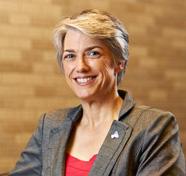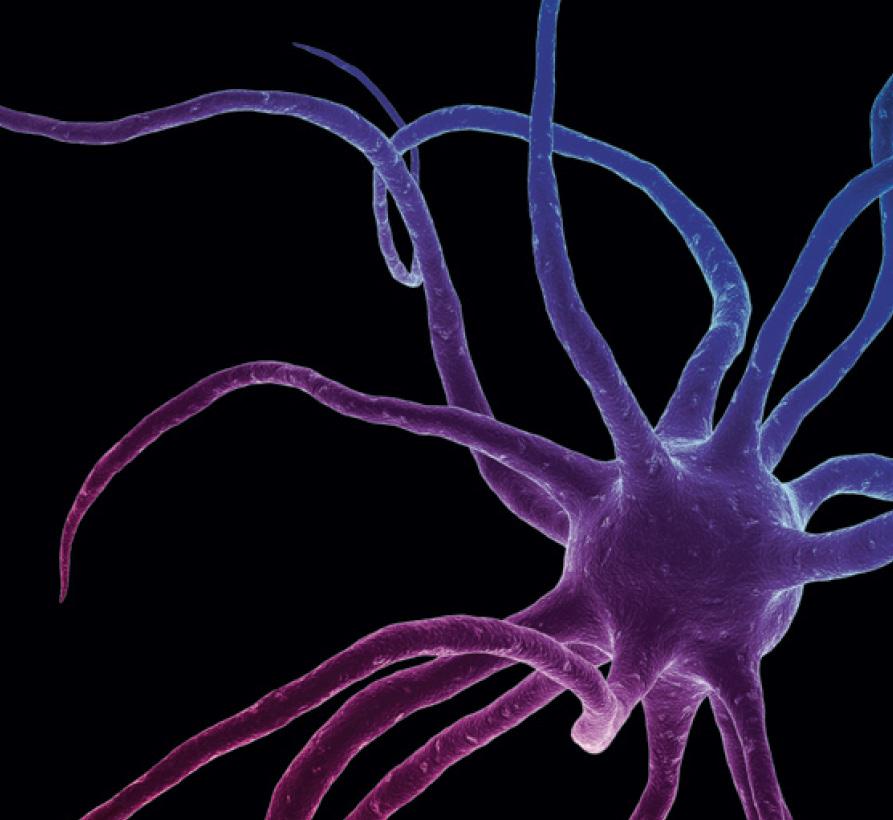FOSTERING BRAIN GROWTH

“In 1989, I started working with Child Protective Services as a volunteer,” said Emy Lou Baldridge. “We had a lot of children who had been diagnosed with failure to thrive syndrome. Dr. Bruce Perry from Houston, Texas showed us the brain image of a child who had failure to thrive, and you could actually see dark spots in the brain. That has stuck in my mind all these years.”
Emy Lou and Jerry Baldridge have made a 30-year mission out of supporting children’s causes, giving their time, talent and financial support to programs that provide resources to those in need. Ten years ago, they added Center for BrainHealth to their list of philanthropic causes.

The married couple of 54 years gifted $1 million to the Center for BrainHealth’s Brain Performance Institute capital campaign in support of the first building of its kind, a place that will provide programs to the community that are focused on improving brain health. The campaign’s vision to reach and serve a greater number of people than the traditional brain research model aligned with the Baldridges’ charitable philosophy.
“Through volunteer work I have seen the devastating challenges teens in low-income neighborhoods face and know that they are full of untapped potential,” said Emy Lou. “I was thrilled to learn that low-income students who participated in the teen reasoning research study at the Center for BrainHealth improved their grades after the training program. Dedicating this building means that there will be more programs like this available to those who need it, which I think is so important.”
Emy Lou is recognized for her long resumé of community involvement as a child advocate. Among her accomplishments is a Greater Texas
Community Partners initiative to help CPS case workers gain access to essential supplies for abused and neglected children, such as formula, diapers and car seats. The program has been emulated at the state level and had the support of former first lady Laura Bush. Jerry has also given of his time. He served for many years as a financial counselor for Interfaith Housing Coalition where he provided money saving tips and advice on how to attain gainful employment on a one-on-one basis to clients who were homeless. He is currently on the board of Dallas Afterschool.
The Baldridges’ generous capital campaign contribution helps advance the Brain Performance Institute’s goal to deliver the latest advances in brain science to the public as quickly as possible, offering cognitive training programs, community lectures and other brain-enhancing options.
“It’s nice to have the research knowledge, but to put it to use really makes the difference,” explained Jerry. “The idea of turning research projects into programs that benefit people should be very interesting and productive. It’s not like anything that we’ve ever seen before.”
Kellie’s Story: Turning the Tides on Bipolar
Q1 | 2016
03
Deception in the
06
04
Exploring
Brain
Traumatic Brain Injury Research
Jerry and Emy Lou Baldridge
LETTER from the Director
COLLABORATING FOR DISCOVERY & PROGRESS
Intensely rich collaboration is the only way to solve the mysteries of the human brain and create the tools necessary to realize and fine tune optimal human brain performance across the lifespan.
Since establishing the Center for BrainHealth 17 years ago, we have grown from a small group of eight into a collaborative powerhouse of six faculty, more than a dozen labs and 150+ scientists, research clinicians, and staff. Our robust team includes cognitive neuroscientists, medical doctors, biostatisticians, brain imaging specialists, neuroengineers, psychologists and speech language pathologists.
Xiaosi Gu, Ph.D., is an assistant professor at The University of Texas at Dallas. At the Center for BrainHealth, her research in computational psychiatry examines the neural and computational mechanisms underlying human decision-making and social interaction in both health and disease.


“The future of mental health will be to depart from the one-pill-fits-all era to an age of individualized care that can specifically target an underlying disorder based not only on behavior, but also neural data. Using imaging technology and advanced analysis, we will one day be able to objectively measure psychological well-being and evaluate the effectiveness of treatment and therapy.”
Francesca Filbey, Ph.D., is an associate professor at The University of Texas at Dallas and holds the Bert Moore Chair in Behavioral and Brain Sciences. She researches the causes and consequences of addiction.
“Progress in science can be facilitated by translational research that brings real-world applications of scientific discoveries to bear. For example, a ‘bench-to-bedside’ approach brings important findings from basic research into human applications that also promotes interdisciplinary collaborations. Translational, integrative approaches allow a more comprehensive understanding of the underpinnings of behavior from vast perspectives.”
Daniel Krawczyk, PhD, is an associate professor at The University of Texas at Dallas and holds the Debbie and Jim Francis Chair in BrainHealth. His research interests include working memory, reasoning, decisionmaking, and social cognition.


“There is a big gap from the lab to real-life surveys. As we continue to develop brain and behavioral measures, it is important to emphasize how imaging, genetics, behavior and neuropsychological markers are related and how they can work together to maximize what’s most important for dailylife functioning.”
Together we are purpose-driven to uncover breakthroughs in brain health and translate them as quickly as possible into biomarkers of brain health, novel interventions, therapies and pharmaceutical treatments. We are helping people today whether they have a healthy brain, brain injury, or brain disease.
Each quarter BrainMatters conveys brief, lay-friendly highlights of the latest scientific discoveries happening across all of the BrainHealth labs, shares inspirational feedback from research and program participants, and recognizes the many lead supporters who realize the impact our work will make for generations to come.
As the first quarter of 2016 launches a productive beginning of the new year, we embrace a bright future for brain science. To share the momentum, lab leaders have shared a snapshot of their unique point of view.
Join us on our unparalleled exploration to change today’s discoveries into the future of brain health. Don’t miss the daily news sharing on our website for a more in depth look at the articles included in this edition and follow us on social media to expand and extend the conversation.
Sandra Bond Chapman, Ph.D. Founder and Chief Director, Center for BrainHealth

Bart Rypma, Ph.D., is an associate professor at The University of Texas at Dallas and holds the Meadows Foundation Chair. His research explores the cognitive and neurobiological mechanisms of human memory and how these are affected by aging and disease.
“To make meaningful contributions to improving the human condition, brain science must move beyond the study of neurons alone to understand the functioning, living brain, in its dynamic integrative entirety.”
Jeffrey S. Spence, Ph.D., is the Director of Biostatistics at the Center for BrainHealth and also holds an adjunct faculty appointment in the Department of Internal Medicine, Division of Epidemiology at The UT Southwestern Medical Center.



“We must not only define brain health, but also utilize a rich, multimodal database that can objectively measure it. Successfully leveraging neuroinformatics, a combination of modeling, statistics, and computing, can make this complicated task manageable, creating a future where we can monitor the brain in health and evaluate therapeutic improvement following injury or disease.”
“One cannot consider the individual brain in isolation; it is a complex system with multiple interactions between mind, brain, body and environment.”
John Hart, Jr., M.D., is a professor at The University of Texas at Dallas, the medical science director at Center for BrainHealth, and holds the Jane and Bud Smith Distinguished Chair. He has a joint appointment in the departments of neurology and psychiatry at The UT Southwestern Medical Center. He is one of the world’s foremost experts on how memory is stored and knowledge is accessed.
“After years of dissecting how cognitive-anatomic units function in the brain, I feel the future role of cognitive neuroscience will be to construct what we call ‘neural circuits’ from these specific units we have detected. As all neural circuits in the brain function to conduct the electrical impulses of brain cells, modulating these circuits electrically can lead to improving poor performance after injury. Thus, our lab is focused on constructing these circuits for how individuals retrieve and store longterm memories and modulate these circuits electrically using a variety of investigative techniques.”
Ian Robertson, Ph.D., is the T. Boone Pickens Distinguished Scientist at the Center for BrainHealth and Chair of Psychology at Trinity College Dublin.
DECODING DECEPTION
Social interactions, such as navigating a conversation or determining whether someone is being truthful or not, are some of the most complex tasks the brain carries out, yet little is understood about the social brain on a neurobiological level. Defense Advanced Research Projects Agency (DARPA) Biotechnology Office awarded scientists at Center for BrainHealth a $450,000 grant to develop a method that would map and quantify aspects of the social brain. The first study of its kind, researchers will investigate the finite characteristic of deception using imaging technology and advanced mathematical analysis to quantify its brainbasis. The study will incorporate the impact of cultural differences, an aspect increasing relevant to military intelligence gathering operations.
“Previous studies indicate that individuals accurately judge someone as truthful only 54% of the time,” said study principal investigator Daniel Krawczyk, Ph.D., associate professor and the Debbie and Jim Francis Chair in BrainHealth at the Center for

BrainHealth. “There is some evidence to suggest that we might actually have a better chance at correctly assessing whether someone is telling the truth or not using intuition rather than deliberate thought. These implicit, often rapid judgments we typically associate with intuition must exist at some level in the brain and are exactly what we are trying to capture.”
The pilot study will include 50 healthy men between the ages of 18 and 35 of East Asian and Euro-Caucasian descent who will review video scenarios of people telling lies or truths while undergoing functional magnetic resonance imaging (fMRI). The research team will assess brain patterns during three different situations: When an individual is observing lies or truths; when an individual is perceiving someone as trustworthy or untrustworthy; and whether these two forms of deception are easier to recognize in people of the same or a different culture.
“Of utmost importance is demonstrating not who is lying or who is not trustworthy, but
that we can use this method to decode the social brain,” said Leanne Young, Center for BrainHealth research assistant working on the study.
“There is nothing more important than our ability to interact socially,” explained study collaborator James Bartlett, Ph.D., Interim Dean of the School of Behavioral and Brain Sciences at UT Dallas. “If we can map what is happening at a neural level and tie those patterns to an individual’s thoughts or actions in a healthy brain, we believe we will eventually have the ability to use that information to drive therapeutic treatments for various social impairments such as autism, post-traumatic stress disorder, schizophrenia and others.”
The results of this study may help DARPA effectively and quantitatively measure the complex social aspects of military training and operations in environments where social intelligence is critical for cross-cultural awareness, interactions and ultimately, survival.
“Of utmost importance is demonstrating not who is lying or who is not trustworthy, but that we can use this method to decode the social brain.”
Dr. Daniel Krawczyk and doctoral student Leanne Young
BRAIN CONNECTIVITY
DISRUPTIONS MAY EXPLAIN COGNITIVE DEFICITS IN PEOPLE WITH BRAIN INJURY

COGNITIVE NEUROSCIENCE OF ADDICTIVE BEHAVIORS
Cognitive impairment following a traumatic brain injury (TBI) is common, often adversely affecting quality of life for those 1.7 million Americans who experience a TBI each year. Researchers at the Center for BrainHealth have identified complex brain connectivity patterns in individuals with chronic phases of traumatic brain injury which may explain long-term higher order cognitive function deficits.
A study recently published in the Journal of International Neuropsychological Society found that individuals who are at least six months post-injury exhibit between-network, long-range and inter-hemispheric connectivity disruptions. Specifically, scientists observed TBI-related connectivity disruptions in the default mode and dorsal attention networks and the default mode and frontoparietal control networks; interactions among the networks are key to achieving daily life goals.
“Cooperation between the default mode network, dorsal attention and the frontoparietal control networks is key to controlling internal trains of thought and achieving tasks in changing environments,” said Kihwan Han, Ph.D., study lead author and postdoctoral research associate at the Center for BrainHealth. “Interactions among these networks are intricately intertwined and critical to daily life tasks such as planning, learning and problem solving. This work suggests that cognitive deficits may be a result of reduced efficiency in brain-network communications.”
“Much research has focused on separating out individual brain networks,” said Daniel Krawczyk, Ph.D., principal investigator, associate professor of cognitive neuroscience and cognitive psychology at the Center for BrainHealth and Debbie and Jim Francis Chair in BrainHealth at The University of Texas at Dallas.
“This is the first study of its kind to show the intercorrelations among different networks and disruptions among them in individuals with TBI.”
“If key brain networks cannot interact in a normal way, the brain becomes inefficient,” Krawczyk explained. “Our future research will examine how networks can be improved or enhanced, even after a traumatic brain injury, with cognitive intervention.”
This work has been supported by Department of Defense CDMRP grants W81XWH-11-2-0194 and W81XWH-11-2-0195 and a grant from the Meadows Foundation.
PUBLICATION: THE BRAIN AND ADDICTION
Director of Cognitive Neuroscience of Addictive Behaviors, Francesca Filbey, Ph.D., researches the causes and consequences of addiction at the Center for BrainHealth. She was recently a contributing author and editor of Neuroimaging and Psychosocial Addiction Treatment: An Integrative Guide for Researchers and Clinicians. The book provides a comprehensive, interdisciplinary understanding of what has been discovered from neuroimaging techniques in terms of clinical approaches in addiction.
“By highlighting the current scientific literature on this emergent topic, the authors of this book hope that both clinicians and researchers alike can make advancements on who and how treatment works,” said Francesca Filbey, Ph.D.
PRESTIGIOUS PLACEMENT FOR BRAINHEALTH POSTDOC

UT Dallas doctoral student Sam DeWitt, M.S., is the recipient of a postdoctoral fellowship at the Icahn School of Medicine at Mount Sinai, a medical school consistently ranked in the top 20 for research productivity nationwide. His work will focus on reward processing from a neuroimaging perspective in adolescents with mood and anxiety disorders.
“We are very excited for Sam to join us in the Pediatric Mood and Anxiety Disorders Program at the Icahn School of Medicine at Mount Sinai,” said Vilma Gabbay, M.D., Chief of the Pediatric Mood and Anxiety Disorders Program and Associate Professor of Psychiatry and Neuroscience, Icahn School of Medicine at Mount Sinai. “His expertise in fMRI and his experience with research on reward functioning in adolescent populations make him extremely well-suited to contribute to our projects that examine reward circuitry dysfunction in youth. We were extremely impressed by Sam when he came to interview at Mount Sinai and know that he will be an excellent addition to our team!”
DeWitt is scheduled to receive his Ph.D. in cognition and neuroscience this spring before heading to Mount Sinai Medical Center in New York in August. He is currently a research assistant in the Cognitive Neuroscience Research of Addictive Behaviors lab at the Center for BrainHealth under the direction of Francesca Filbey, Ph.D. where he added seven publications to his credit, serving as lead author on two of them.
“I am very excited about this opportunity. It is a perfect continuation of my current dissertation research that focuses on the neural underpinnings of reward processing in healthy adolescents,” said DeWitt. “I always envisioned that the next step would be turning my attention towards such processes in clinical adolescent populations.”
DeWitt holds a master’s degree in Applied Cognition and Neuroscience from UT Dallas and completed his undergraduate degree in psychology with a minor in neuroscience at The Ohio State University. He studied translational neuroscience at the Mind Research Network at the University of New Mexico for two years before joining the Center for BrainHealth.
“This is a high honor for Sam and his advisor, Dr. Francesca Filbey,” said Bruce Jones, Ph.D., the director of research and operations at Center for BrainHealth. “The UT Dallas neuroscience program is growing in reputation, and Sinai is a really prestigious placement.”

LAB NEWS
Kihwan Han, Ph.D.
DR. DIANNA JAFFIN: ADVANCING HUMAN PERFORMANCE OPTIMIZATION
She joins the Dallas team from Bethesda, Maryland, where she served as the Director of Innovation and Strategy for the Consortium of Health and Military Performance (CHAMP) at the U.S. Department of Defense Center of Excellence for translation of human performance optimization science.

A leader in the Department of Defense human performance optimization community, Jaffin played a critical role in the U.S. Army Brain Health Initiative and Human Dimension Concept, an initiative to enhance the human element in combat situations. She has also developed and led wellness programs for corporations, government agencies, and firefighters.
As the Brain Performance Institute prepares to open in spring 2017, Executive Director Eric Bennett has empowered Jaffin to lead a team that vets innovative options for future Institute offerings.
“Dr. Jaffin’s invaluable insight and shrewd business sense have proven successful at the highest levels of the U.S. Department of Defense,” said Bennett. “We are extremely lucky to have her on our team.”

With several publications and presentations to her credit, Jaffin is not just a program leader, but also a subject matter expert in multiple domains that affect human performance such as sleep, exercise, stress management, and nutrition. She has experience not only creating programs, but also implementing and marketing them to the end user.
“What first attracted me to Center for BrainHealth research is its emphasis on translational science and culture of innovation and collaboration. There are few places like this in the country, if any,” Jaffin says. “I’m looking forward to the opportunity to help explore new ways for people to achieve their performance goals. I believe in taking a holistic approach that combines cognitive training with exercise, nutrition that supports brain health, effective stress management, and sleep.”
BRAIN TRAINING GOES TO LAW SCHOOL


Last summer, Texas Tech Law School partnered with the Center for BrainHealth’s Brain Performance Institute to bring high performance brain training known as SMART (Strategic Memory Advanced Reasoning Training) to incoming first-year students. The partnership expanded in January, delivering the program to third-year law students as well as select law school faculty and staff. “I really am convinced that this is something positive and impactful,” law school dean Darby Dickerson told the ABA Journal. “In 10 years, everyone is going to know about this and be adopting these strategies.”
Grew up in Melbourne, FL and has lived in Centreville, VA for the last 30 years
BS in Electrical Engineering from Florida Inst. of Technology
MS in Exercise Science and Health from George Mason University
Ph.D. in Neuroscience from George Mason University
Area of research: Cerebrovascular hemodynamic alterations associated with blunt cervical vascular injuries in the trauma and/or brain-injured patient using transcranial Doppler
Certified Exercise Physiologist
Adjunct Faculty at George Mason University and the Uniformed Services University

Certified Project Management Professional (PMP)

IN NOVEMBER, THE CENTER FOR BRAINHEALTH WELCOMED DIANNA PURVIS JAFFIN, PH.D., PMP, TO THE ROLE OF DIRECTOR OF STRATEGY AND PROGRAMS FOR ITS BRAIN PERFORMANCE INSTITUTE.
DR. DIANNA JAFFIN
Darby Dickerson, Texas Tech Law School Dean
Third-year law SMART participants at Texas Tech Law School. Texas Tech Law School staff participating in the SMART program.
Third-year law students participating in the SMART program at Texas Tech Law School.
KELLIE’S STORY: A TURNING POINT
Kellie Lander decided she needed to change her life, and in order to do that, she needed to change her environment. She purchased new furniture, artwork and dishes. Her mania spiraled into painting walls and rearranging furniture, but it came to a screeching halt when she began to rehang her “self-esteem wall”. A wall set aside for her accomplishments, it had been filled with diplomas, photos from her travels around the world and the time she lived in London for three years, as well as pictures of people who were important to her.
The memories made her sad and reminded her of the things she believed she no longer had and would never have again. At age 40, after decades of suffering with incredible mood swings, Kellie was diagnosed with Bipolar Disorder I. She was placed on medical leave from her career where she had been a special educator, a Safe and Drug Free School counselor, and had earned 36 hours towards her Ph.D. in counseling and criminal justice.
She had been in treatment and was taking medications to manage the disorder for five years. It had been seven years since her last date, and relationships with her family were strained.



Then a high school friend named Micah reconnected with her via Facebook and convinced her to join the Center for BrainHealth’s bipolar study with him.
During the first of the study’s four high performance brain training sessions, Kellie felt an instant connection with the clinician and an immediate connection to the strategies taught. When she returned home, one class theme resonated: Make priorities manageable. She

decided to tackle her “self-esteem wall”, starting with her high school diploma, in honor or her friend who had introduced her to the Center’s study. By the end of the weekend, she had recreated the wall, leaving several empty spots to remind her that she will have new successes to fill the frames.
Six months after completing the study, Kellie has a new boyfriend, regained her parent’s trust and remains steady on her medication. She no longer requires prescription medication to sleep at night.

“The medication manages my bipolar disorder, but pills couldn’t make me a better decision-maker,” says Kellie. “I am so grateful to my friend Micah for making me participate in this study. My decision-making skills have changed 180 degrees. It has absolutely changed my life.”
APRIL
Presented by:
Topic:

ANNUAL
10TH
REPROGRAMMING THE BRAIN TO HEALTH SYMPOSIUM
14, 2016
Computational
to engage cognitive scientists, neuroscientists,
students.
Speaker: Professor Karl Friston, FRS, FMedSci Wellcome Principal Research Fellow and Scientific Director Wellcome Trust Centre for Neuroimaging Professor Institute of Neurology, University College London Ladies, grab your hats! Gents, fasten your bow ties! For more information or to register, visit centerforbrainhealth.org/events Proceeds benefit Center for BrainHealth’s Discovery Group, a program that helps people recently diagnosed with Alzheimer’s and other forms of dementia build a framework for moving forward. Saturday, May 7, 2016 4:00-8:00 p.m. Marie Gabrielle 2728 N. Harwood Street Title Sponsor: To purchase tickets or join the online auction, visit: handbid.com/auctions/tag-derby/
Psychiatry and Neurology Designed
physicians, psychologists, rehabilitation specialists, researchers, educators, and
Keynote
6 TH ANNUAL TAG KENTUCKY DERBY PARTY
Kellie Lander
EVERY TUESDAY NIGHT IN FEBRUARY APPROXIMATELY 400 PEOPLE ATTENDED THE CENTER FOR BRAINHEALTH’S ANNUAL LECTURE SERIES.
















THE BRAIN: AN OWNER’S GUIDE 2016 LECTURE SERIES
Made possible by the generosity and vision of

Tuesday, February 2, 2016 – The Emy Lou & Jerry Baldridge Lecture MINDFUL WORK: HOW MEDITATION CAN TRANSFORM BUSINESS


“Mindfulness isn’t a religion. It’s not a spirituality...Mindfulness is about being right here, right now, in the present moment, on purpose and non-judgmental, not worrying about the past and not thinking too much about the future.”
– DAVID GELLES
Tuesday, February 9, 2016 – The Gratitude Foundation Lecture BRAIN-MACHINE INTERFACES: FROM BASIC SCIENCE TO NEUROLOGICAL REHABILITATION
“The human brain can do things that most of us think are impossible. When you really get a human being aiming at something with enough energy and passion, even things that we think are science fiction, actually tend to happen.”
– MIGUEL NICOLELIS, M.D., PH.D.

Tuesday, February 16, 2016 – The Fluor Corporation Lecture


VIDEO GAMES: INNOVATIVE APPROACHES TO ENHANCE BRAIN HEALTH AT ANY AGE

“The advantage of noninvasive neuro-technology is that you will be able to have more targeted, individualized treatment.”
– ADAM GAZZALEY, M.D., PH.D.
Tuesday, February 23, 2016 – The Quest Capital Management, Inc. Lecture A GUT FEELING ABOUT THE BRAIN: THE MICROBIOME AS A KEY REGULATOR OF NEURODEVELOPMENT AND BEHAVIOR

“We are just beginning to really understand how important your gut bacteria is to regulating a whole host of brain functions from neurogenesis to blood-brain barrier.”
– JOHN CRYAN, PH.D.
Eric & Robin Bennett, Dawn & Steve Moore
Laurie & Todd Platt
Jeff & Carol Heller
Shirley & Bill McIntyre
Andy McCarthy, Miguel Nicolelis, Samara Kline Patty Huffines, Holly Huffines, Adrienne Strodel
Arthur Bollon & Rhonda Porterfield Carlos & Debbie Hernandez
Gano Ehlers, Joel & Linda Robuck, Eric Bennett
David & Cher Jacobs Jennifer & Coley Clark
Sandi Chapman & Lyda Hill
Suzanne & Lance Charriere, Sandi Chapman, Barbara Daseke Scott & Diane Sealy Bill & Dawn Hennessey Sue & Pryor Blackwell
SEEN & HEARD
Bonnie Pitman & Mary Cook
Jerry & Emy Lou Baldridge
Kay & Jim Hammond
BRAIN MATTERS BRAIN FOOD
EXPLORING THE GUT-BRAIN CONNECTION
A microbiome is the collective genetic material of our bacteria, viruses and fungi within our gut. Data show that some of the more complex aspects of brain function— the birth of brain neurons, how immune cells in the brain work—are all regulated by microbiomes.
TIPS FOR A HEALTHY MICROBIOME FROM JOHN CRYAN, PH.D.:
Eat a diverse diet with plenty of fiber-rich, unprocessed foods
Avoid antibiotics as much as possible
Get a pet
Expose yourself to green environments

“Our work is in complete alignment with the ideas and philosophy of the Center for BrainHealth in terms of managing a repertoire of resilience…”
– John Cryan, Ph.D. Neuropharmacologist and microbiome expert University College of Cork, Ireland
To learn about the gut brain connection, visit: CenterforBrainHealth.org/lecturevideos
• Scientists Weigh in on the Future of Brain Health


• Exploring Deception in the Brain
• Traumatic Brain Injury Research
OF
• Kellie’s Story: Turning the Tides on Bipolar
• Seen & Heard at The Brain: An Owner’s Guide
2200 West Mockingbird Lane Dallas, TX 75235
INSIDE THIS EDITION
BRAIN MATTERS





















































